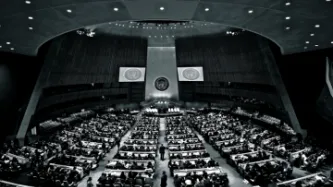Search
Content type: News & Analysis
Going into 2014, there were high hopes for advancing privacy protections and to finally have the debate around surveillance we've been clamouring for. Privacy was even Dictionary.com's word of the year in 2013. Europe was on the edge of passing new strong privacy laws, despite protests from industry and governments. Parliaments in Canada and the United Kingdom had pushed back against expanding surveillance laws. Transparency reports were beginning to shine a more comprehensive picture on…
Content type: Press release
The Investigatory Powers Tribunal (IPT) today followed its previous judgments in finding that UK security services may in principle carry out mass surveillance of all fibre optic cables entering or leaving the UK under RIPA, the 2000 law that pre-dates the modern internet.
In summary, the Tribunal in today's decision said the system of mass surveillance disclosed by Edward Snowden could in principle be lawful. But the Tribunal has asked for more submissions about whether…
Content type: News & Analysis
After remaining in the shadows for decades, the right to privacy is finally having its day in the sun at the United Nations.
And rightfully so, given how seriously the right has been uniquely threatened in the past few years. Technology continues to rapidly evolve in the digital age, Western intelligence agencies are undertaking mass and indiscriminate surveillance of the world's communications, and countries around the world are continually adopting heavy-handed policies that imperil privacy…
Content type: News & Analysis
In a recent trip to Colombia, Privacy International learned that the Colombian mobile phone network does not use any form of encryption. In this sense, Colombian communications are stuck in the 1990s, where cryptography was not yet widespread, and was still tightly controlled by governments who feared its spread could threaten their capabilities to conduct surveillance.
The issue of encryption on mobile phones though is not unique to Colombia. The Director of the FBI has been on a media blitz…
Content type: Long Read
Many people imagine intelligence sharing to be a practice whereby men in trench coats silently slide manilla envelopes containing anonymous tip-offs or intelligence reports marked TOP SECRET across tables in smoke-filled rooms.
While such practices certainly exist, they represent only a tiny slice of intelligence sharing activities, and are vastly overshadowed by the massive exchange of bulk unanlysed (raw) intelligence data that takes place between the UK and its Five Eyes allies.…
Content type: News & Analysis
In the last two days multiple security vendors, newspapers and experts have weighed in on the existence of the “Regin" malware, among the most sophisticated ever discovered, and its possible origins at GCHQ and the NSA. The Intercept has now confirmed Regin was the malware found on infected internal computer systems and email servers at Belgacom, the Belgian telecommunications company. Last year, documents leaked by Edward Snowden established that it was GCHQ that had committed the attack on…
Content type: News & Analysis
The United Nations today adopted an important resolution reaffirming the right to privacy in the digital age, condemning unlawful government mass surveillance and calling on member States to review their legislation and policies to ensure that they are in line with human rights law.
Despite efforts by the United States, the “Five Eyes” surveillance alliance, and other states to weaken its language, the resolution reflects some of the important findings contained in the UN…
Content type: Press release
Governments across Central Asia have deployed advanced surveillance systems, including monitoring centres capable of spying on an entire country's communications, according to a new investigative report published today by Privacy International.
The comprehensive report, “Private Interests: Monitoring Central Asia”, contains personal accounts taken by Privacy International detailing how Central Asian governments use electronic surveillance technology to spy on activists and…
Content type: News & Analysis
Privacy international is proud to release “Private Interests: Monitoring Central Asia”, a 96-page report detailing its findings from an extensive investigation into electronic surveillance technologies in Kazakhstan, Kyrgyzstan, Tajikistan, Turkmenistan, and Uzbekistan.
The report brings together the findings of PI's team of investigative researchers, consultants, and technical, legal and policy experts, and is the outcome of consultations with confidential sources, regional experts,…
Content type: News & Analysis
Governments across Latin America are struggling to put in place effective intelligence and surveillance oversight regimes that guarantee the rights of citizens, according to a new report released by Privacy International's partner in Argentina, Asociación por los Derechos Civiles.
The report, "Who's watching the watchers? A comparative study of intelligence organisations oversight mechanisms", provides analysis of intelligence agency oversight frameworks in Argentina, Brazil, Chile, Colombia,…
Content type: News & Analysis
In Egypt, the internet, social media and online engagement have provided a critical platform in recent years for Egyptians to express their frustration and demand change after years of social, economic and political repression. The use of social media during protests, and the government's recent attempts to crack down on the use of services like Twitter and Facebook, have been widely reported.
So it was with shock and disappointment that Privacy International looked on earlier this month…
Content type: News & Analysis
To read Privacy International's take on the ruling, go here.
What does the decision actually say?
The primary question that the Court was asked to consider was whether Google Search has obligations under the Data Protection Directive 1995, the EU legal framework regulating how public bodies and businesses deal with individuals’ personal data.
There were three primary issues at hand: the first was whether Google Inc., the international entity which operates Google Search, was under the…
Content type: News & Analysis
Since the European Court of Justice in May ruled in the “right to be forgotten” case, there has been a dizzying amount of debate about the decision, and its implications for privacy and free expression.
A main thread within these discussions is an old story that US Industry loves to tell and has told for some time: Europeans love privacy law, and Americans love free speech, and the twain shall never meet.
The Google Search case at the European Court of Justice has fuelled this view…
Content type: Press release
Privacy International, Reporters Without Borders, Digitale Gesellschaft, FIDH, and Human Rights Watch welcome news that the European Commission will move ahead and add specific forms of surveillance technology to the EU control list on dual use items, thus taking steps to finally hold companies to account who sell spy equipment and enable human rights abuses.
These important steps demonstrate that policymakers are beginning to wake up to the real harm that exists…
Content type: News & Analysis
The past year has been an important one for the right to privacy. Privacy was Dictionary.com’s word of the year in 2013. Human Rights Watch called it “The Right Whose Time Has Come (again).”
However, privacy has not received enough attention in the international bodies that are meant to ensure our human rights are protected: there has been no major statement on privacy by a United Nations human rights body since 1988.
One crucial step to protect privacy, and address how the…
Content type: News & Analysis
The following appeared in the Daily Telegraph, and was written by Carly Nyst, Legal Director of Privacy International:
"Robert Hannigan, the new head of GCHQ, announced his arrival this week with a call for “greater co-operation” with security forces by tech companies. Hannigan’s article in the Financial Times illustrated vividly the destructive ideology that has driven the infiltration by the British and American intelligence agencies into every aspects of the digital realm – an…
Content type: News & Analysis
Thousands of innocent people in London have had their communications spied on and collected through the use of invasive mobile phone surveillance technology, called IMSI Catchers, according to a recent report by the Times.
IMSI Catchers are no longer, and have not been for a while, a law enforcement secret. They have been featured crime dramas like the Wire and in movies such as Zero Dark Thirty. For years, the German Parliament has publicly received the number of IMSI Catcher…
Content type: News & Analysis
The following piece by Privacy International Legal Officer Adriana Edmeades appeared in openDemocracy:
In 2012, Citizen Lab, a think-tank operating out of the Munk School of Global Affairs at the University of Toronto, came across evidence suggesting that Gamma International, a multinational technology corporation with offices across the world, sold a form of malware called FinFisher to Bahrain. Bahraini activists, amongst others, were seriously concerned: FinFisher gives its operator complete…
Content type: News & Analysis
As privacy and free expression advocates hail the demise of the Data Retention Directive at the hands of the European Court of Justice, one large question is looming in the midst of celebration.
Now what?
More specifically, what will be its impact of the national laws of the European Union countries? What steps should EU governments be taking to ensure the Court’s decision is given effect? What are the implications for communications service providers who have been…
Content type: Press release
Britain's intelligence services do not need a warrant to receive unlimited bulk intelligence from the NSA and other foreign agencies, and can keep this data on a massive searchable database for up to two years, according to secret internal policies revealed today by human rights organisations.
Details of previously unknown internal policies, which GCHQ was forced to reveal during legal proceedings challenging their surveillance practices in the wake of the Snowden revelations, reveal…
Content type: News & Analysis
A sizeable political controversy has engulfed President Goodluck Jonathan’s Government in Nigeria, where details surrounding its plans for the total surveillance of Africa’s most populous country continue to emerge.
Thanks to pervasive snooping technology readily found and developed in the US, UK, Israel and the Netherlands, the already spy-equipped security forces in Nigeria will have greater and more intimate access to the lives of some 56 million Internet users and 115 million active fixed…
Content type: Long Read
Privacy International in October 2014 made a criminal complaint to the National Cyber Crime Unit of the National Crime Agency, urging the immediate investigation of the unlawful surveillance of three Bahraini activists living in the UK by Bahraini authorities using the intrusive malware FinFisher supplied by British company Gamma.
Moosa Abd-Ali Ali, Jaafar Al Hasabi and Saeed Al-Shehabi, three pro-democracy Bahraini activists who were granted asylum in the UK, suffered variously…
Content type: News & Analysis
Jaafar Al Hasabi, Mohammed Moosa Abd-Ali Ali, and Saeed Al-Shehabi each fled Bahrain for the United Kingdom with one goal: to be safe.
These men, activists in the pro-democracy movement in Bahrain, were variously subject to torture, arbitrary detention, harassment, and psychological trauma in their home country. They thought coming to the UK, and living in exile, would at least mean they would be outside the reach of the Bahraini government.
Despite the nearly 4,000 miles between their homes…
Content type: News & Analysis
Between 15th-19th of September, in the week leading up the first year aniversary of the 13 Necessary and Proportionate Principles, Privacy International and the coalition behind the 13 Principles will be conducting a Week of Action explaining some of the key guiding principles for surveillance law reform. Every day, we'll take on a different part of the principles, exploring what’s at stake and what we need to do to bring intelligence agencies and the police back under the rule of law. You can…
Content type: Long Read
Bad analogies about surveillance technology pervade newspaper reports, politicians’ speeches, and legal arguments. While it’s natural to want simple explanations to understand complex technology, it does us a disservice when governments, the media, or the courts mislead us through analogies that are inadequate. It is even worse if these analogies are used as a basis for policy change.
Privacy International’s legal challenge against GCHQ’s mass surveillance rests…
Content type: News & Analysis
In a disturbing move to broaden its mass surveillance powers, the government of Australia is pushing forward a bill that undermines fundamental rights, including the right to privacy. Disappointingly, this comes mere months after civil society and citizens alike expressed outrage over the Australian intelligence service’s offer to share deeply personal information about ordinary citizens with its Five Eyes partners.
The Bill, which amends the Australian…
Content type: News & Analysis
The publishing of materials from a support server belonging to surveillance-industry giant Gamma International has provided a trove of information for technologists, security researchers and activists. This has given the world a direct insight into a tight-knit industry, which demands secrecy for themselves and their clients, but ultimately assists in the violation human rights of ordinary people without care or reproach.
Now for the first time, there is solid confirmation of Gamma's…
Content type: News & Analysis
Last year, UK-based surveillance company Gamma TSE sold the Indonesian military US$ 6.7 million worth of equipment as part of the military's weapons modernisation effort. As early as 2005, Indonesian officials were soliciting the advice of a close partner of Gamma, Germany-based Elaman, to create technical surveillance unit (TSU), according to a white paper published as part of the WikiLeak SpyFiles and found in the Surveillance Industry Index.
Gamma and Elaman are…
Content type: News & Analysis
This is a guest piece. It does not necessarily reflect the views or position of Privacy International
To open a bank account in Pakistan, to get a new driver license or passport or to activate a SIM card, you need to present a computerized national identity card. These cards are about more than just proving identity; they are essential to getting on with your day-to-day life.
So what happens when you lose your identity to fraud?
Pakistan is one of the few nations that has registered…
Content type: News & Analysis
The following is an excerpt from an op-ed that appeared in the Daily Telegraph written by Carly Nyst, Legal Director of Privacy International:
One of the most shocking discoveries from Edward Snowden's disclosures was that GCHQ, the British intelligence agency, is tapping undersea cables to harvest the communications of people from all around the world. This top-secret programme, nicknamed Tempora, sucks up petabytes of data from tapped cables off the coast of Cornwall and is capable…
























